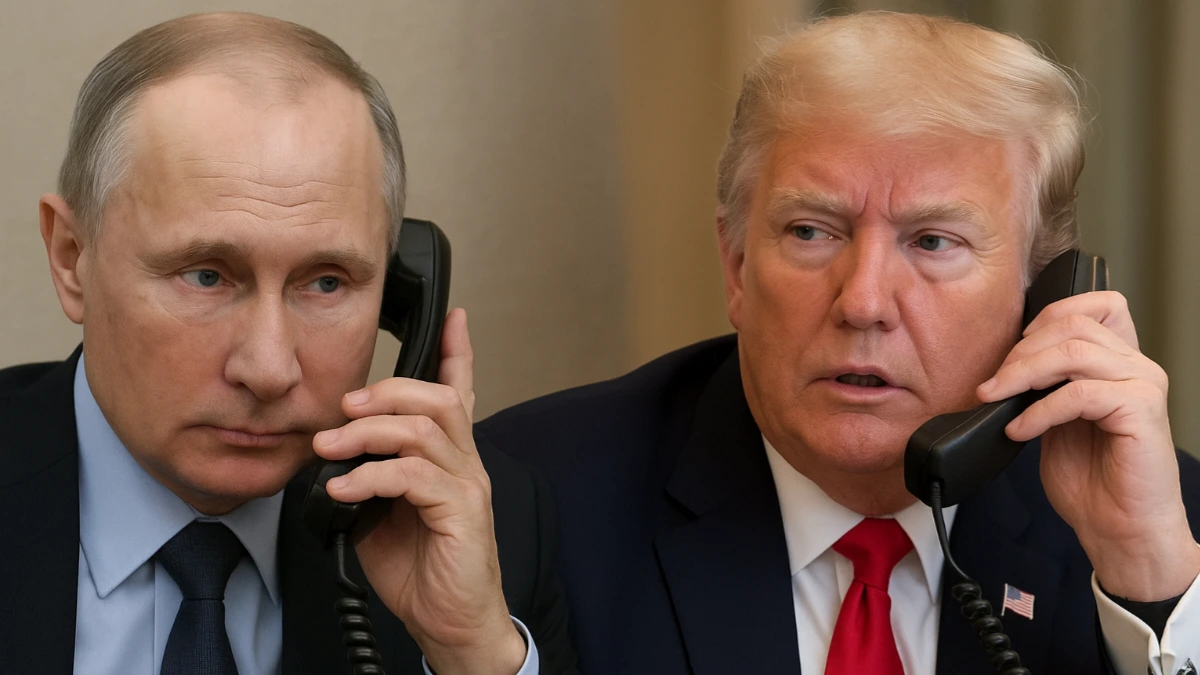MOSCOW — Russian President Vladimir V. Putin initiated a phone call with former US President Donald Trump on Thursday, marking their eighth known conversation this year, as tensions over Ukraine remain high.
The Kremlin said the call was prompted by Mr. Trump recent diplomatic trip to the Middle East and described the conversation as cordial and focused on bilateral cooperation.
The timing of the call, a day before Ukrainian President Volodymyr Zelenskyy was scheduled to meet with Mr. Trump in Washington, reflects Russia’s ongoing efforts to maintain influence over US policy while continuing its military operations in Ukraine.
Since the start of Russia’s invasion of Ukraine, Moscow has combined military action with high level diplomatic outreach. President Putin has repeatedly emphasized his willingness to negotiate while simultaneously pursuing military objectives in eastern Ukraine.
In recent months, President Trump signaled potential US military support for Kyiv, including long range Tomahawk cruise missiles. Russian officials have expressed concern over the delivery of such weaponry, warning it could escalate the conflict further.
During Thursday’s call, Mr. Trump reportedly indicated reluctance to provide these missiles, saying, “We need Tomahawks for the United States of America too,” according to sources familiar with the conversation.
The Kremlin also highlighted the potential for economic engagement. In February, Mr. Putin suggested American companies could participate in developing aluminum production in Siberia and mining rare earth metals in Russian occupied Ukrainian territory.
In a separate social media post, a senior Russian aide even floated the idea of a high profile infrastructure project linking Alaska and eastern Russia.
Analysts note that the call is part of a deliberate Russian strategy to influence US policy without making concessions on the battlefield.
“Putin is investing significant time in managing his relationship with Trump and his allies,” said George Barros, a Russia analyst at the Institute for the Study of War. “It’s a calculated effort to slow American support for Ukraine while keeping diplomatic channels open.”
Alexander Gabuev, director of the Carnegie Russia Eurasia Center, added that the Kremlin’s approach blends flattery with potential economic incentives.
“Even short term pauses in US assistance are valuable for Moscow,” he said. “Russia is playing a long game to manage US engagement on its terms.”
This year alone, President Putin has conducted eight phone calls with Mr. Trump and met several times with the former president’s close associate and White House envoy, Steve Witkoff.
These interactions roughly match the frequency of his engagements with close allies such as Belarusian President Aleksandr Lukashenko.
In August, Mr. Putin hosted a summit in Alaska with Mr. Witkoff, signaling a broader effort to maintain direct dialogue with US officials even as military operations continued.
In Kyiv, uncertainty persists over the potential arrival of advanced US weaponry. A Ukrainian defense official, speaking on condition of anonymity, said the call between the two leaders had “added a layer of complexity” to planning for future support.
Meanwhile, ordinary Ukrainians remain focused on the conflict itself. “We hope international support continues,” said Olena Kovalenko, a teacher in Kharkiv. “But we can see that politics often delays real assistance on the ground.”
Both the Kremlin and the former US president’s circle have suggested that further high level meetings may take place, with Budapest mentioned as a possible location for a Trump Putin summit.
Kremlin spokesman Dmitry Peskov said preliminary discussions between Russian and US officials are required before any formal summit, emphasizing the need for “detailed planning to ensure constructive dialogue.”
Observers expect Moscow to continue balancing military operations with diplomatic outreach, using engagement with former President Trump to influence US policy while keeping pressure on Ukraine.
Thursday’s phone call underscores the complexity of US Russia relations amid the ongoing conflict in Ukraine.
While diplomatic channels remain open, both sides continue to navigate a delicate balance between military strategy and international diplomacy.
The developments highlight how personal relationships and political influence can shape global security decisions, even in times of active warfare.
